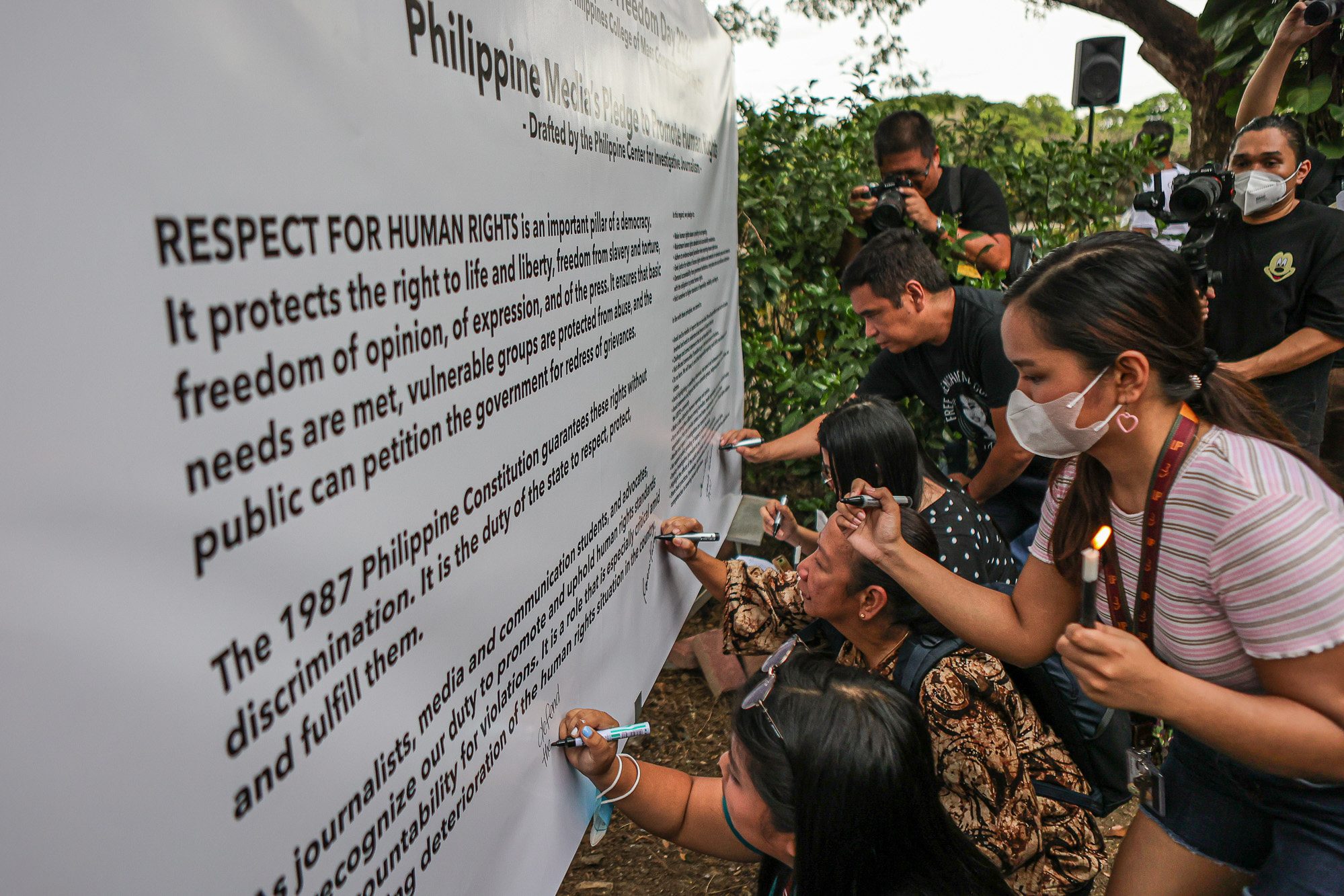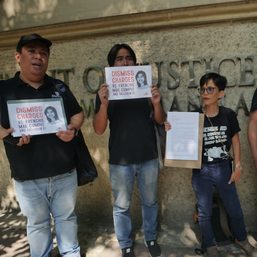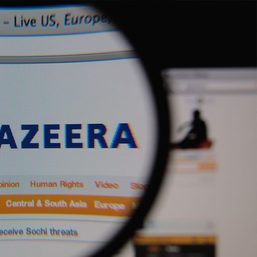SUMMARY
This is AI generated summarization, which may have errors. For context, always refer to the full article.

MANILA, Philippines – Countries where press freedom is under attack are also the places where there’s lower trust scores in news and in the media, according to an associate professor of journalism at the UP College of Mass Communication.
In an interview with ABS-CBN on Friday, June 16, Yvonne Chua, author of the Philippine situation report in the annual Reuters Institute for the Study of Journalism (RISJ), said the past year again shows the correlation between the attacks on media and the low trust scores of certain media brands reflected in the survey.
“Reuters took time out to explore the data sets and found a correlation between media criticism and the low trust levels in certain countries. And the Philippines emerged as one of those with the most disturbing correlations,” she said in the interview.
Chua explained that news organizations such as Rappler and ABS-CBN, which have been “demonized” by government, select politicians and pro-establishment entities, are the ones that “suffer or have low trust levels or higher distrust scores” in the report.
Chua said this has been a “consistent theme” in the report’s profile on the Philippines. This is also happening globally, especially in countries in the global south such as Brazil, Mexico, South Africa, and in Hong Kong.
The broadcasting franchise of ABS-CBN was terminated in 2020 on orders of then-president Rodrigo Duterte. Rappler was ordered shut down in 2018, a few months after Duterte blasted the news organization in his State of the Nation Address and falsely accused it of being foreign-owned. Rappler has questioned the order, and it remains pending in court along with legal cases lodged against it.
Part of the RISJ’s annual report is a table showing trust scores of media groups among the populace. Rappler has a 47% “Trust” score, 33% “Don’t Trust” score, and 21% “Neither” score, compared to last year’s 46% “Trust” score and 32% “Don’t Trust” score.
Chua said the situation in the Philippines “is the one that keeps highlighting the fact that the low trust scores” could be the result of the attacks on the media, including “bad-mouthing of journalists, and on the cases filed against them.
“It’s no different this year. We stress it again: that independent media that are at the receiving end of attacks are likely to suffer from low trust scores,” she said.
Overall, the RISJ study also found that countries where press freedom is under attack are those where trust in media is badly impacted.
“Reuters Institute has found that in countries where press freedom index is lower, these are countries where you tend lower trust scores in news and in the media,” Chua said.
The Philippines has had a country report in the study only since 2020, and Chua said that over the last three years, disinformation and misinformation have been coming “primarily” from politicians, with Facebook as the leading platform for “misinformation in the Philippines.” The RISJ survey has been running for 11 years or since 2012.
‘Perception survey’
When asked in the ABS-CBN interview to comment on the criticisms about the study, Chua said the survey is an “online survey” on “news consumption habits…a perception survey.”
Chua agreed that the trust scores have been “abused by bad actors,” but she added that those affected should “respond to the criticism and show how bad actors misuse the information.” Rappler has been exposing disinformation networks since 2016, and how they have used social media to attack journalists and newsrooms.
On the methodology of the survey, she said Reuters tried to make the sample as “representative as possible of gender, region, education, income.”
However, Chua admitted that just like “any online survey, “it could underrepresent certain voices, like older people and those who don’t have access to the internet.”
She said that in the survey, respondents, which numbered 90,000 worldwide, were showed 15 leading news brands and they are asked how trustworthy the brand is. For this year, RISJ chose to include SMNI, a red-tagging site in the Philippines that is behind false claims and propaganda against activists and journalists, including Rappler and its CEO Maria Ressa.
RISJ’s respondents had the option to answer between 0 to10. An answer from 6 to 10 falls under trusted, and an answer from 0 to 4 falls under don’t trust, with 5 falling under neither trust or distrust.
In her report, Chua said the “Philippine media landscape remains largely grim despite the change in the country’s leadership in mid-2022.”
Ressa resigned last year from the RISJ board over its measurement of trust scores.
She went public with the move this week as the metric continued to be used this year, without sufficiently taking into account the disinformation campaigns that Rappler has endured through the years, and social media algorithms’ biases for hate and lies.
“Last year I resigned from the board because I thought it was horrendous that they went ahead with it and that it was weaponized and used against us, at a critical time,” Ressa told The Guardian. “Government officials were quoting Oxford University’s Reuters Institute for the Study of Journalism to attack us.”
In her resignation letter to RISJ in July 2022 after the organization released its media trust scores for that year, Ressa said: “The graphics you have used through the years are misleading and lack proper labels. The note you quote, ‘should not be treated as a list of the most trusted brands’ is not enough when it’s not part of the chart itself. It also then belies why have that chart in the first place for what are – at most – vanity metrics. The way you market the report and its headlines lead to what you call ‘abuse’ but they are natural consequences of this flawed approach.
The RISJ said that it has considered Ressa’s input in reviewing their methodology, to “mitigate against the risk of abuse” but concedes that like “all work in the public domain, our research can be abused.” – Rappler.com
Add a comment
How does this make you feel?

![[ANALYSIS] The weaponization of ‘trust’](https://www.rappler.com/tachyon/2022/06/weaponization-trust-june-16-2022.jpg?fit=449%2C449)





![[DECODED] The Philippines and Brazil have a lot in common. Online toxicity is one.](https://www.rappler.com/tachyon/2024/07/misogyny-tech-carousel-revised-decoded-july-2024.jpg?resize=257%2C257&crop_strategy=attention)







![[OPINION] You don’t always need a journalism degree to be a journalist](https://www.rappler.com/tachyon/2024/06/jed-harme-fellowship-essay-june-19-2024.jpg?resize=257%2C257&crop=287px%2C0px%2C720px%2C720px)

![[Just Saying] Ted Failon, press freedom, and the Supreme Court](https://www.rappler.com/tachyon/2024/07/20240709-ted-failon-press-freedom-supreme-court.jpg?resize=257%2C257&crop=296px%2C0px%2C720px%2C720px)

There are no comments yet. Add your comment to start the conversation.